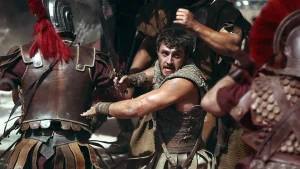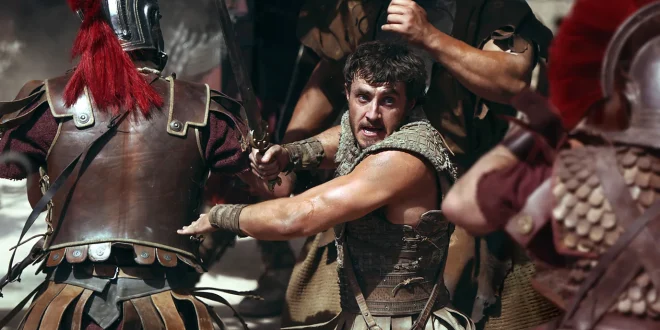“The general who became a slave. The slave who became a gladiator. The gladiator who defied an empire. From director Ridley Scott…” You could run the voiceover for a trailer for the original Gladiator over the new trailer for its upcoming sequel and it would still seem reasonably accurate.

The plot of the 2000 film boils down to “Roman unjustly brought low uses his prowess in the gladiatorial arena to effect revenge on those who wronged him” and, so far as we can tell, it also applies to Gladiator II, due to be released in November.
Russell Crowe, in the title role, was never better. The action scenes were relentless, thrilling and visceral. The dialogue was eminently quotable. Even people who may not particularly remember the movie as a whole know “Are you not entertained?”, “What we do in life echoes in eternity” and “At my signal, unleash hell”. Film buffs can and will recite at the drop of a hat the “My name is Maximus Decimus Meridius, Commander of the Armies of the North…” speech.
But there is more to the anticipation for the sequel: there is nostalgia for a whole different style of filmmaking. As we move past cinema’s superhero saturation, Gladiator II is a callback to an earlier style of blockbuster. The once huge “sword and sandal” genre arguably peaked the first time round with Spartacus in 1960 but there seems to be a real appetite for it again. A major 10-part series called Those About To Die, set in Ancient Rome and starring Anthony Hopkins and Iwan Rheon, is released on Peacock next week. And Denzel Washington, one of the stars of Gladiator II, is also set to star in an Antoine Fuqua-directed movie for Netflix about Hannibal, the Carthaginian who challenged Rome.
The release of Gladiator in 2000 was a watershed moment in modern culture for interest in Ancient Rome – Dr David Butterfield.
Dr David Butterfield, editor of the Classics website Antigone, tells the BBC: “Whether or not Gladiator II does reprise the plot of the original Gladiator, the excitement about a sequel speaks volumes about how drawn modern audiences are to immersing themselves in such a fascinating and influential civilisation, whose striking similarities to, and stark differences from, our own era prove to be equally instructive.
“The release of Gladiator in 2000 was a watershed moment in modern culture for interest in Ancient Rome. Not only did it bring to life the city which forged the empire that shaped so much of western history, but it also reintroduced into the mainstream long-forgotten subjects such as the complex relationship between imperial power and the mass populace and the principles of Stoic philosophy.”
Famously, Scott’s primary concern is not historical accuracy. When historian Dan Snow listed some inaccuracies in his last film, Napoleon, Scott suggested that he should “Get a life”. He told The Times, “When I have issues with historians, I ask: ‘Excuse me, mate, were you there?'”
However, Butterfield points out that two of the more startling images in the new trailer – the flooding of the Colosseum to recreate a sea battle and the introduction of a rhinoceros into a gladiatorial fight – are actually historically accurate.

“Although some academics will feel a spring in their step from pointing out occasional inaccuracies or anachronisms in works of fiction such as this, the reality is that large-budget, long-form pieces of art such as Gladiator II are most likely to be the first introduction into the ancient world for a public whose historical education is woefully underserved in schools,” he says.
Meanwhile, author Robert Hutton, film critic for The Critic magazine and presenter of a film podcast says of the upcoming film: “My immediate instinct is that it’s part of Hollywood’s obsession with ‘Existing Intellectual Property’: this will be easier to sell because people liked the last one, even though that was, what 25 years ago, and Ridley Scott’s last couple of films haven’t really blown the roof off.”
It’s a well-trodden path, says Hutton. “There’s a long tradition of swords and sandals in Hollywood, although the results are mixed. We remember Ben Hur (1959), Spartacus (1960) and Gladiator, but no one much talks about Pompeii (2014) or The Eagle (2011). Partly there’s a problem of getting people to suspend their disbelief. It’s probably helpful on that score to have a leading man, Paul Mescal, who isn’t yet super-famous. Anyone who’d seen Russell Crowe in LA Confidential (1997) knew he was a brilliant actor, but he wasn’t quite a leading man before Gladiator.”
Crowe’s are certainly big sandals to fill. Is Mescal, the young Irish actor, up to it? Ridley Scott has no doubt. “Can I see Paul Mescal being as big as Russell Crowe? For sure,” he has said. “I watched Normal People. It’s not my kind of show but I saw four episodes in a row – boom, boom, boom. I was thinking, ‘Who the hell is this Paul Mescal?’” That was enough for the director to approach the relative newcomer.
In the arena of modern cinema, Scott has an enviable string of victories – including The Duellists (1977), Alien (1979), Blade Runner (1982), Thelma and Louise (1991), Black Hawk Down (2001), Prometheus (2012) and, of course, Gladiator. Is he about to record another win? Alea iacta est – or “the die is cast” – as they used to say in Rome.
Gladiator 2 will be released in UK cinemas on 15 November and US cinemas on 22 November.
 Gistfox Your News Window To The World
Gistfox Your News Window To The World 




